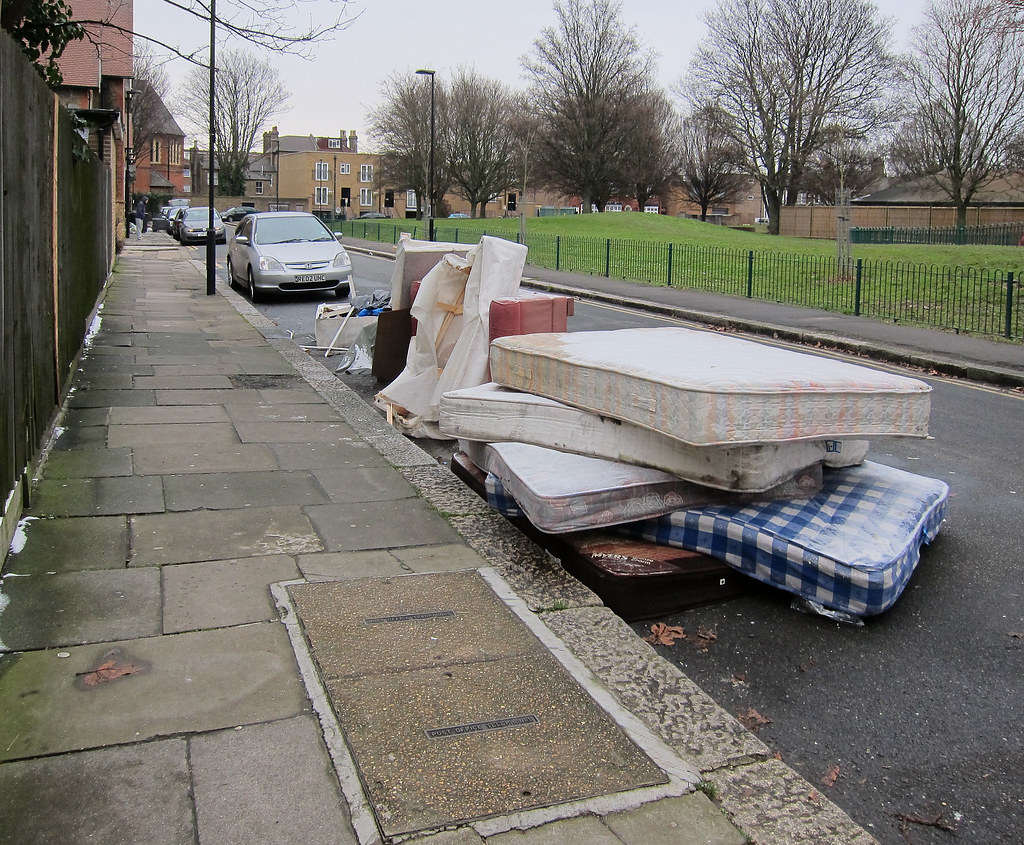
“Fly-tipping in Kemble Road N17” by Alan Stanton is licensed under CC BY-SA 2.0.
Fly-tipping, the illegal disposal of waste, has become a significant issue in the UK, affecting urban and rural areas alike. This article explores why fly-tipping is on the rise, who is responsible, and how it impacts everyone.
The Surge in Fly-Tipping Incidents
Recent statistics reveal a troubling increase in fly-tipping incidents across the UK. In the 2022/23 period, local authorities in England dealt with 1.08 million fly-tipping incidents1. This illegal activity is not just a minor nuisance; it represents a substantial environmental and economic burden.
Factors Contributing to the Rise
Several factors contribute to the rise in fly-tipping:
- Economic Pressures: The cost of legal waste disposal has increased, leading some individuals and businesses to seek cheaper, illegal alternatives.
- Reduced Waste Collection Services: Budget cuts have led to reduced waste collection services in some areas, prompting people to dispose of waste illegally.
- Organized Crime: There is evidence that organized criminal gangs are behind many large-scale fly-tipping operations. These gangs often use fake companies to collect waste and then dump it illegally2.
- Lack of Enforcement: Despite the rising number of incidents, enforcement actions and prosecutions have not kept pace. In 2022/23, the number of court fines for fly-tipping decreased by 17%1.
Who is Responsible?
Fly-tipping is carried out by a range of perpetrators, from individuals to organized crime groups.
Individual Offenders
Many fly-tipping incidents involve individuals disposing of household waste. This can include anything from old furniture and appliances to garden waste. The most common place for fly-tipping to occur is on highways, accounting for 40% of total incidents in 2022/231.
Businesses and Contractors
Some businesses, particularly those in construction and landscaping, may illegally dump waste to avoid disposal fees. Rogue waste carriers, who offer to dispose of waste cheaply, are also a significant part of the problem. These carriers often advertise their services online or through social media, collecting waste from households and businesses and then dumping it illegally.
Organized Crime
Organized criminal gangs are increasingly involved in fly-tipping. These gangs often operate on a large scale, using lorries to dump significant amounts of waste, including hazardous materials like asbestos3. The involvement of organized crime has made fly-tipping a more complex and challenging issue to tackle.
The Impact on Communities and the Environment
Fly-tipping has far-reaching consequences that affect everyone.
Environmental Damage
Illegally dumped waste can cause significant environmental harm. Hazardous materials can contaminate soil and water, posing risks to wildlife and human health. Fly-tipping in rural areas can also damage natural habitats and landscapes.
Economic Costs
The economic cost of fly-tipping is substantial. Local authorities spent £13.2 million clearing large fly-tipping incidents in 2022/231. This figure does not include the costs borne by private landowners, who are often responsible for clearing waste dumped on their property. For farmers and rural landowners, the financial burden can be particularly severe, with some forced to invest in security measures to protect their land3.
Social Impact
Fly-tipping can blight communities, making areas look neglected and unsafe. It can also attract further illegal activities, creating a cycle of decline. For residents, the presence of fly-tipped waste can reduce the quality of life and property values.
Tackling the Problem
Addressing the issue of fly-tipping requires a multi-faceted approach.
Increased Enforcement
Stronger enforcement and higher penalties are essential to deter offenders. This includes more frequent inspections, greater use of surveillance technology, and tougher penalties for those caught fly-tipping.
Public Awareness
Raising public awareness about the consequences of fly-tipping and the importance of legal waste disposal is crucial. Campaigns can educate people about the environmental and social impacts of fly-tipping and encourage responsible behavior.
Support for Legal Disposal
Making legal waste disposal more accessible and affordable can help reduce fly-tipping. This could include increasing the availability of waste disposal facilities, offering free or subsidized disposal services, and simplifying the process for disposing of large or hazardous items.
Conclusion
Fly-tipping is a growing problem in the UK, driven by economic pressures, reduced waste services, and organized crime. It has significant environmental, economic, and social impacts, affecting everyone. Tackling this issue requires a comprehensive approach, including stronger enforcement, public education, and support for legal waste disposal. By working together, communities, authorities, and individuals can help reduce fly-tipping and protect the environment.
Please watch this video on Fly Tipping for further info.


